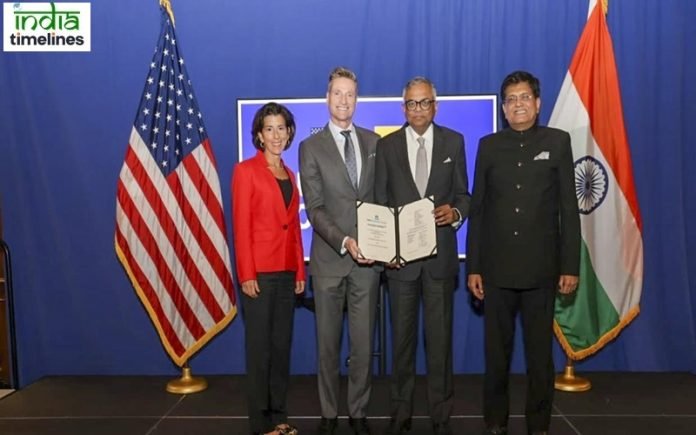
On October 4, 2024, India and the United States solidified a key strategic partnership by signing a Memorandum of Understanding (MoU) aimed at strengthening supply chains for critical minerals. These minerals, including lithium and cobalt, are essential for advancing clean energy technologies and electric vehicles (EVs), both of which are crucial to the global transition to renewable energy. The agreement reflects growing cooperation between the two countries, particularly in the context of building resilient, sustainable, and secure supply chains for critical materials.
The Importance of Critical Minerals
Critical minerals such as lithium, cobalt, nickel, and rare earth elements are indispensable in the production of batteries for electric vehicles, renewable energy storage systems, and other advanced technologies. These minerals play a pivotal role in the global shift toward cleaner energy sources, as they are key components in technologies designed to reduce carbon emissions and dependency on fossil fuels. However, the extraction and supply of these minerals are often controlled by a small number of countries, leading to concerns over potential supply disruptions and price volatility. Currently, China dominates the global supply chain for these minerals, controlling a significant portion of mining and processing operations.
Objectives of the MoU
The MoU signed between India’s Trade Minister, Piyush Goyal, and U.S. Commerce Secretary, Gina Raimondo, focuses on enhancing cooperation between the two nations in several critical areas. These include the exploration, extraction, processing, and recycling of key minerals required for the clean energy transition. Additionally, the agreement emphasizes the development of policies and best practices to facilitate commercial development in this sector, fostering technology exchange, and improving infrastructure.
The partnership is part of a broader U.S. strategy to diversify its supply chains and reduce dependency on any single country for critical materials. As the world’s largest democracy and a major player in global technology, India is seen as an important ally in securing these supply chains, not just for itself and the U.S., but also for other nations pursuing clean energy goals.
Enhancing Supply Chain Resilience
A key goal of the agreement is to bolster resilience in the critical minerals sector. Given the increasing demand for EVs and the ongoing expansion of renewable energy infrastructure, ensuring a steady supply of these materials is of paramount importance. The MoU aims to create open and transparent supply chains between the U.S. and India, reducing the risk of bottlenecks that could hamper the growth of industries reliant on these minerals. It also paves the way for new investments and technological collaborations that will help both countries tap into previously untapped resources, streamline extraction processes, and develop new recycling methods.
The U.S. Commerce Department highlighted that this agreement is not just about securing minerals for short-term needs but establishing a framework for long-term cooperation. The priority areas of focus include identifying the necessary equipment and services, establishing policies for sustainable extraction and processing, and integrating technologies that can enhance mineral recovery and recycling efforts.
Involvement of Third Countries
One notable aspect of this agreement is the emphasis on involving third-party countries, particularly those in mineral-rich regions like Africa and South America. Both India and the U.S. recognize that collaboration with these countries will be essential to ensuring a diversified and secure supply chain. Engaging with these nations will enable the exploration of new mining opportunities, technological sharing, and the development of infrastructure that can support global clean energy initiatives. This approach also mitigates over-reliance on any one source, fostering a more stable global supply chain for critical minerals.
Broader Implications for U.S.-India Relations
This agreement is seen as a continuation of the growing strategic partnership between the U.S. and India, particularly in the area of clean energy. However, it falls short of a full critical minerals trade deal, similar to the one the U.S. signed with Japan in 2023. That deal allowed Japanese automakers to benefit from tax credits in the U.S. by securing minerals outside of Chinese control. In contrast, while the India-U.S. MoU does not provide such tax benefits, it still represents a significant step toward closer collaboration in the sector.
For India, the MoU aligns with its national priorities of boosting EV adoption and achieving ambitious clean energy targets. The agreement could help India secure a steady supply of critical minerals needed to meet its goal of transitioning to a 30% electric vehicle market share by 2030. For the U.S., this deal strengthens its efforts to create a reliable, diversified supply chain and decrease reliance on Chinese-dominated global markets for these essential resources.
Challenges and the Path Ahead
While the MoU is a promising start, both countries face several challenges in fully realizing the potential of this partnership. Building a resilient supply chain for critical minerals involves significant investment in infrastructure, technology, and workforce training. It also requires a concerted effort to promote sustainable mining practices and address environmental concerns related to mineral extraction.
Additionally, political and economic factors may influence the success of this partnership. Both India and the U.S. must navigate complex relationships with third-party countries and balance their geopolitical interests while fostering collaboration in the critical minerals sector. Nonetheless, this MoU is a positive step toward addressing these challenges and building a more sustainable and secure global supply chain for critical minerals.
In conclusion, the India-U.S. MoU on critical minerals supply chains is a significant milestone in both countries’ efforts to strengthen their clean energy sectors. By focusing on key areas such as exploration, processing, and recycling, the agreement aims to foster a resilient supply chain that can meet the growing global demand for critical minerals. As the world moves toward a greener future, collaborations like this will be essential in ensuring that the necessary resources are available to support this transition.

































